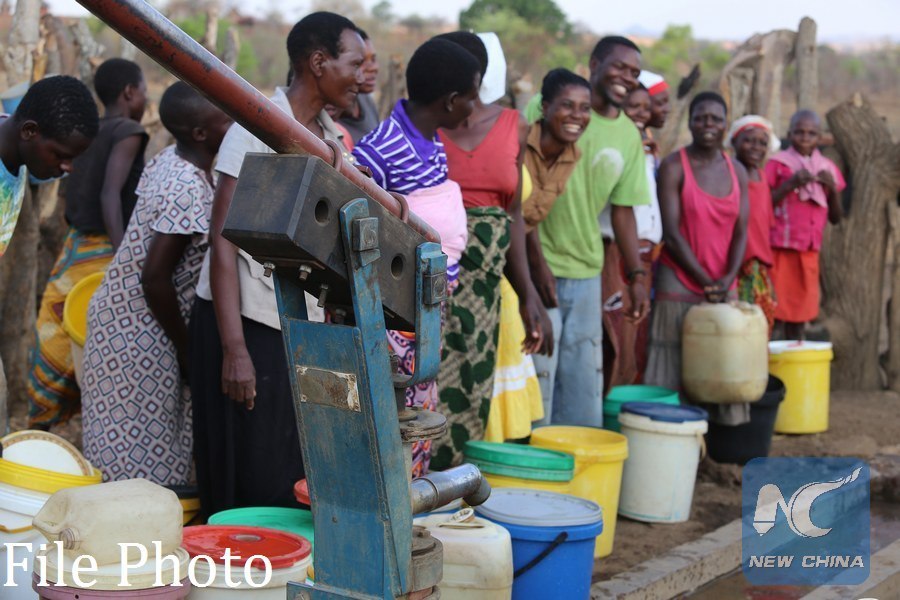
People queue at the borehole of Nyamasota Village in Rushinga, Zimbabwe, November 3, 2016. The borehole was drilled in 2013 and has never dried up like others in the area. The Chinese government is funding the borehole project which is being implemented in three phases and targeting to drill about 500 boreholes in Zimbabwe from 2012 to 2017.(Xinhua/Chen Yaqin)
by Justice Lee Adoboe, Alex Osei-Boateng
SUHUM, Ghana, June 16 (Xinhua) -- Hundreds of rural communities in six out of the ten regions of Ghana can now heave a sigh of relief in their desire to have clean water for household use, thanks to the assistance from the Chinese government.
The government of China is providing 1,000 boreholes for communities to support efforts by the government of Ghana to bring clean water to the people.
Eric Kwaku Mantey in Nana-Boami, a small farming community about 63 km north-west of the capital Accra, told Xinhua in a recent interview that before the China-aided boreholes were made, locals suffered with no access to safe and clean water.
The community used to share a pond of creamy water overgrown with water weeds with cattle as their only source of water.
"But now, thanks to the Chinese government, we have clean water," he said with excitement.
The situation was no different in most of the beneficiary rural communities where women and children of school-going age had to hustle to bring water home for domestic use.
Janet Naa Aryeetey at Asuboi in the Kraboa-Coaltar District, said the community, which used to depend on the Koa stream for water, had been given a new lease of life with the provision of the China-aided borehole.
Although Ghana achieved more than 88 percent nationwide coverage of clean water under the previous Millennium Development Goals by the end of 2015, evidence on the ground was a far cry from the reported data, as most of these communities depended on running water which turned dark brown for most parts of the year due to heavy rains and dry-up in the dried season.
"This project is China government's 1,000 borehole project to support the government of Ghana. The project is in six regions. The beneficiary communities are selected by government of Ghana, but normally every region gets about 160 boreholes," Huang Xianzhou, Project Manager of Zhongmei Engineering Group Limited, said in an interview.
He added that the project was progressing steadily and due for completion on schedule by the end of this year. Huang expressed appreciation for the way the government of Ghana and locals cooperated with his company to implement the project.
The delivery of this laudable project which commenced February 2016 was, however, not without some pain and sacrifice on the part of the Chinese workers as the project was spread across the country compelling the workers to criss-cross the length and breadth of the country several times for implementation.
"It was very difficult for our people to get a place to sleep; they could not find a place to eat. So my Chinese technicians suffered a lot for this project. Sometimes they had to cook under trees. Sometimes they do not have a place to have lunch so they have to eat some biscuit or small fruits for lunch," the project manager pointed out.
Huang said that these efforts, however, are in the interest of the Ghana-China friendly cooperation, and indeed they are beginning to yield dividends as school children in beneficiary communities can now go to school early unlike previously when they spent hours in the morning in search of water, thus wasting education time.
Linda Alhassan, Headmistress of the Santramor Primary School in the Suhum Municipal Area, explained how water scarcity had become a thing of the past due to the intervention by the Chinese government. She said that the nightmare of school children going in search of water for hours and came to school late had come to a halt.
"In fact, as this borehole has come, it has helped us a lot. It has cut down on the water-borne diseases such as diarrhea, cholera," she added.
"The impact of the Chinese intervention on the community is immeasurable. The water helps us in everything we need water for. Most importantly, it has ended our plight of waking up at dawn to go in search of water for hours," said Joyce Boatemaah, a second year Junior High School student at Dago in the Akwapim-South district.
She explained that pupils and students used to go to school very late due to water scarcity in the community which affected their academic work; and sometimes people got bitten by snakes while going in search of water in the dark.
Jasper Quarshie, the Community Water and Sanitation Agency Municipal Technician Engineer for the Suhum District, whose district alone benefited from 10 of the China-aided boreholes, described the intervention as timely.
"Things have improved a lot. In fact I have one of the communities where their water was as dark as cocoa beverage. So when this borehole is built there, they are enjoying it. You can see their children are now going to school early," added the official.

